Did you know CBD and THC are two compounds from the cannabis plant with different effects? THC is psychoactive, giving a “high” feeling. On the other hand, CBD is non-psychoactive and doesn’t make you feel intoxicated. These differences matter for how they’re used and their legal status.
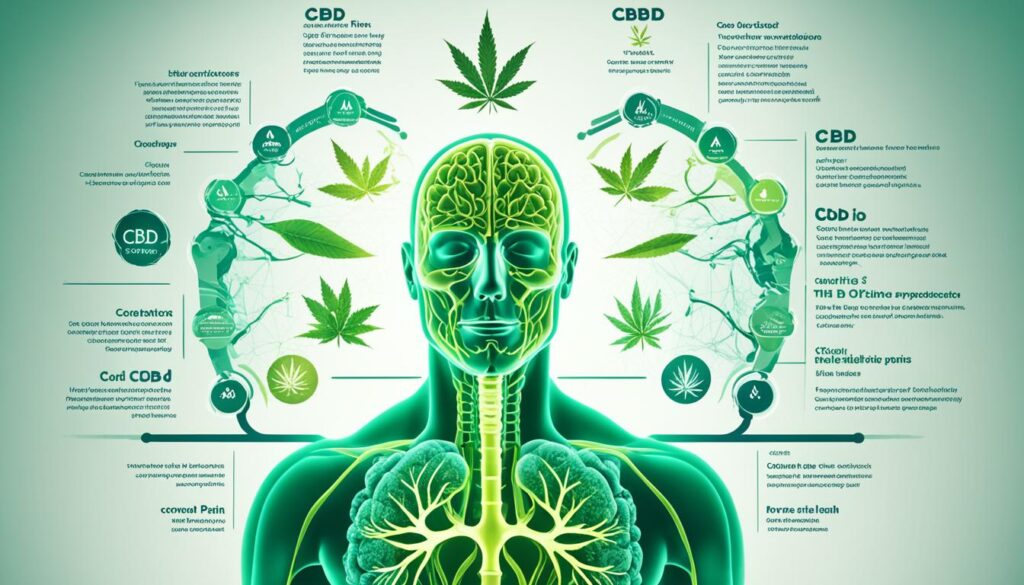
Key Takeaways:
- CBD and THC affect the body differently, with THC being psychoactive and CBD being non-psychoactive.
- The legality and availability of CBD and THC products vary with state and federal laws.
- Both CBD and THC could have medical benefits, but more research is needed to know how effective they are.
- It’s key to talk to a healthcare pro and follow state laws when using CBD or THC products.
- Knowing how CBD and THC differ can help you make better choices about using them.
What is THC?
THC, or delta-9-tetrahydrocannabinol, is the key mind-altering ingredient in the cannabis plant. It causes the high that people feel when they use marijuana. The U.S. Drug Enforcement Agency labels it as a Schedule 1 controlled substance, making its use highly regulated.
Marijuana contains a lot of THC and comes from the cannabis plant. Other products like hashish or hash oil also have plenty of THC.
People can feel THC’s effects in different ways, such as smoking, eating foods with THC, or using THC extracts. Extracts can be in the form of hashish or hash oil.
What is CBD?
CBD, or cannabidiol, comes from the cannabis plant but won’t get you high. It’s mainly found in hemp, a cannabis type low in THC. People use it in oils, extracts, patches, and lotions for its health benefits. And, it’s in Epidiolex, a medicine for epilepsy that the FDA approves.
CBD doesn’t intoxicate you like THC does. It works with your body’s system to help keep things balanced. It may lower inflammation and help with pain, anxiety, and more. People like CBD because it offers relief with fewer side effects than other treatments.
The Benefits of CBD
Many are turning to CBD for its health perks. Studies show it might reduce inflammation, pain, and anxiety. It could also help you sleep better and support heart health. The FDA has even approved Epidiolex, a CBD medication, for epilepsy treatment.
“CBD is commonly used as an adjunct therapy for various conditions, and its popularity continues to grow as more people experience its potential health benefits.”
The Versatility of CBD Products
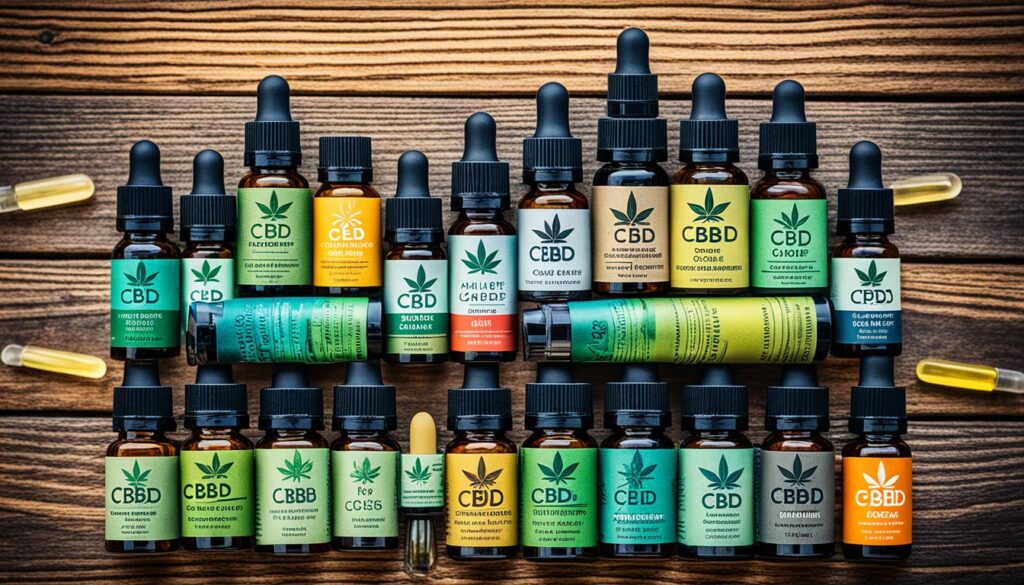
You can find CBD in many forms, letting you pick what works best for you. There are oils, tinctures, capsules, edibles, patches, and creams. Each type has its pros and how you use it.
Oils and tinctures are easy to dose and act fast when taken under the tongue. Edibles are great for those who want something discreet, but they take longer to work. Topical creams are good for spot treating pain right on the skin.
| Product Type | Advantages | Considerations |
|---|---|---|
| Oils and tinctures | Customizable dosing Fast absorption |
Sublingual administration may taste bitter |
| Edibles | Convenient and discreet Long-lasting effects |
Delayed onset of effects May contain added sugars or artificial ingredients |
| Topical creams | Localized pain relief No systemic effects |
May require frequent reapplication |
Remember, the FDA doesn’t oversee CBD products. Quality and strength can differ by brand. It’s smart to pick trusted brands that test their products in labs. This ensures what’s in them is correct and clean.
If you’re looking to ease pain, anxiety, or other issues, CBD might help. With so many choices, you can find something that fits your lifestyle. Always talk to a doctor before adding CBD to your daily regimen.
Chemical Differences between CBD and THC
CBD and THC have the same molecular formula but different chemical properties. This is because of how their atoms are arranged. They both talk to receptors in the brain which changes how brain cells talk to each other.
Research is ongoing on how they work. But, CBD might slow down brain signals, lessen swelling, and change calcium in brain cells.
| CBD | THC | |
|---|---|---|
| Molecular Formula | C21H30O2 | C21H30O2 |
| Chemical Properties | Non-psychoactive, anti-inflammatory, potential health benefits | Psychoactive, intoxicating, potential health benefits |
| Brain Cell Communication | Slows down signals to the brain, modulates calcium levels | Stimulates brain’s reward system, affects dopamine release |
CBD and THC are alike but have different effects on us. So, it’s important to know these differences when we use them.
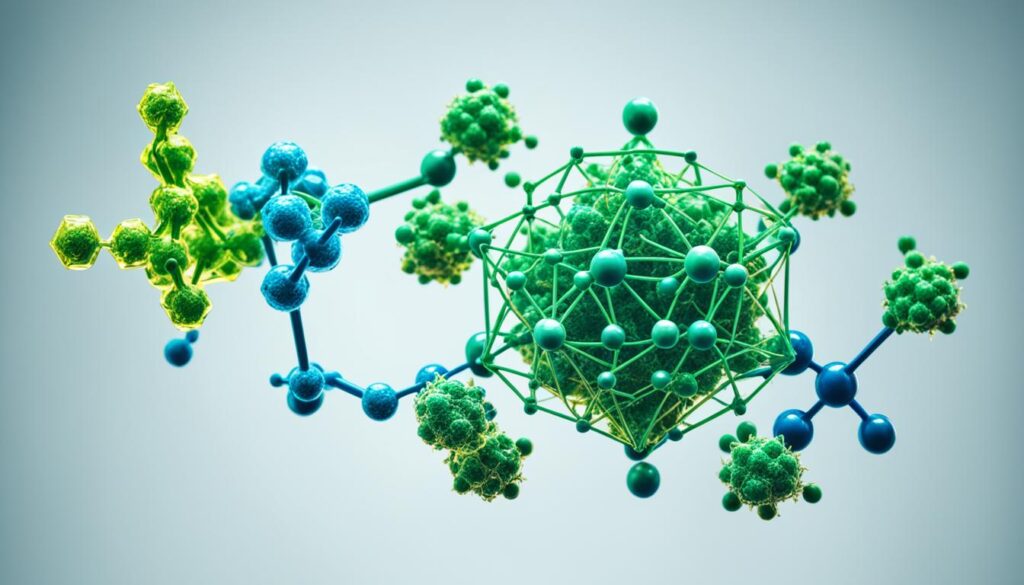
Effects of CBD
CBD, or cannabidiol, is gaining attention for its health benefits. Its effects come from interacting with the body’s systems. However, scientists are still figuring out how it works exactly.
CBD could help lower inflammation. This is important since long-term inflammation can harm our health. Research suggests CBD’s anti-inflammatory abilities might ease symptoms of arthritis and bowel diseases.
It also seems to influence brain health. CBD interacts with the endocannabinoid system, which controls mood, hunger, and sleep. This could mean changes in neurotransmitter levels, affecting our mood and well-being.
However, the CBD market lacks strict regulation. This makes product quality and label accuracy crucial concerns. Some CBD products may not contain the promised amount of CBD. Others might have THC, which is the part of cannabis that makes you feel high.
Choosing high-quality CBD products from trusted sources is key for consumers.
Using CBD might affect drug tests too. Some tests can pick up THC, found in some CBD products. Although CBD doesn’t make you high, it’s essential to buy from reputable brands. This reduces the chance of THC contamination.
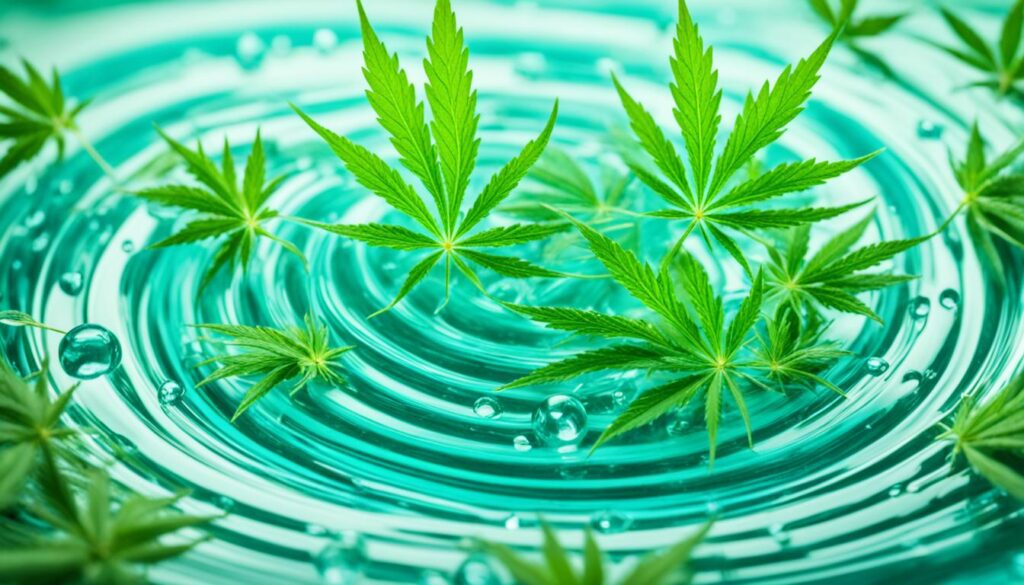
Effects of THC
THC, also known as delta-9-tetrahydrocannabinol, makes the brain release dopamine. This leads to feelings of happiness and excitement. Many people like it for its relaxing and mood-lifting effects.
But, it’s important to know that THC isn’t without its risks. Using too much or too often can lead to mental health issues. These issues include seeing or believing things that aren’t real.
Using THC a lot, or for a long time, might make mental health problems more likely. This is especially true for those already at risk. Being careful and limiting use is key.
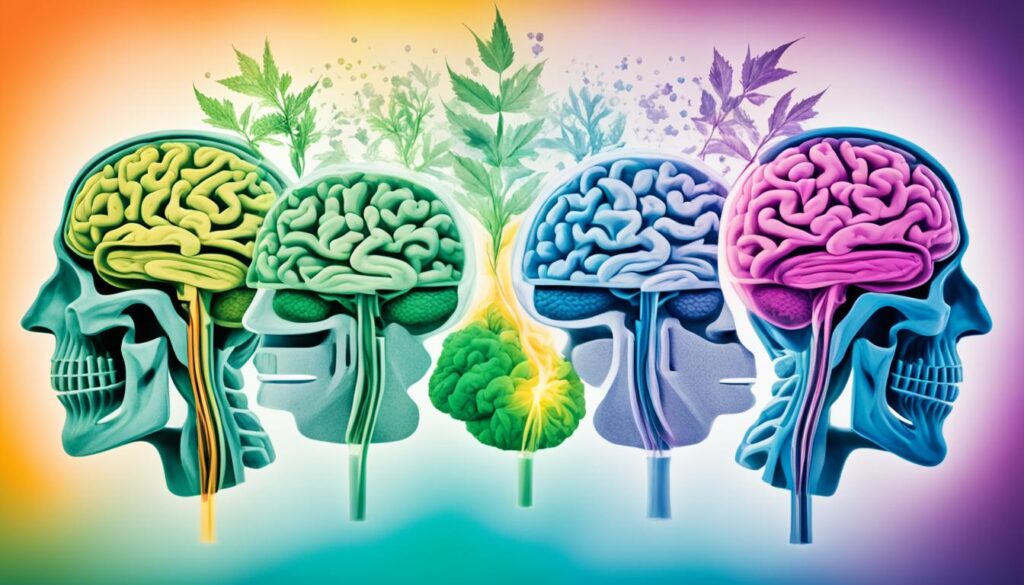
Medical Uses of CBD and THC
CBD and THC have many potential medical benefits. CBD, or cannabidiol, helps with issues like anxiety and inflammation. It interacts with the body’s system to improve mood and reduce pain. This makes it great for those who want relief without THC’s high.
THC, or delta-9-tetrahydrocannabinol, is good for pain relief and relaxation. It has been researched for conditions like muscle stiffness and chronic pain. THC activates receptors that lower pain and inflammation. But it has a psychoactive effect, which some people may not like.
Still, we must recognize the limits of current research on CBD and THC. Laws make it hard to learn more about their medical uses. More studies are needed to understand how they work and their side effects.
| Medical Uses | CBD | THC |
|---|---|---|
| Anxiety | May help reduce anxiety levels and promote relaxation. | May provide relief from anxiety, but higher doses can potentially cause anxiety or paranoia. |
| Inflammation | Believed to have anti-inflammatory properties that can help reduce inflammation in the body. | Has been studied for its potential anti-inflammatory effects, primarily for conditions like arthritis. |
| Pain Relief | May help alleviate different types of pain, including nerve-related pain and chronic pain. | Known for its analgesic properties and ability to provide pain relief. |
| Multiple Sclerosis | Potential use in managing muscle spasms and pain associated with multiple sclerosis (MS). | Can help relieve muscle stiffness and spasms commonly experienced by individuals with MS. |
| Epilepsy | Being researched for its potential in reducing the frequency and severity of seizures in epilepsy patients. | Has shown promise in reducing seizures, particularly in patients with treatment-resistant epilepsy. |
| Nausea | May help alleviate nausea and vomiting, commonly experienced by individuals undergoing chemotherapy or with certain medical conditions. | Has been used to combat nausea and increase appetite in individuals undergoing chemotherapy or dealing with appetite loss. |
Always talk to a healthcare professional before using CBD or THC. They can advise on the best options for your situation.
References:
- Healthline. (2021, July 12). CBD vs. THC: What’s the Difference? Retrieved from https://www.healthline.com/health/cbd-vs-thc
- WebMD. (2020, January 24). Medical Marijuana FAQ. Retrieved from https://www.webmd.com/a-to-z-guides/medical-marijuana-faq
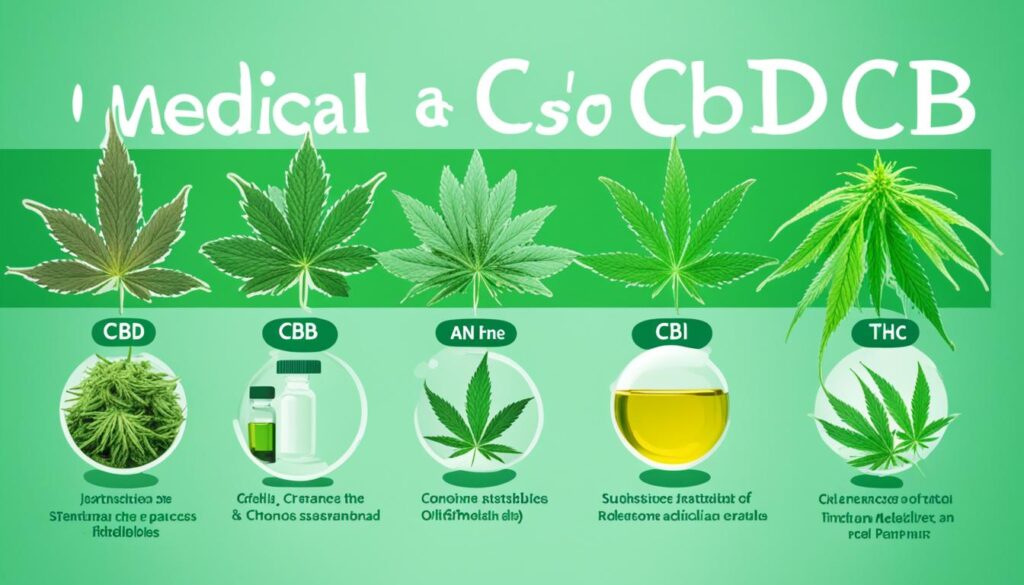
Legal Status of CBD and THC
The legal status of CBD and THC varies. It is influenced by both state and federal laws. To know their legality is key for both consumers and businesses. Here, we will explore the rules for these substances.
CBD Legality
CBD from hemp with under 0.3% THC is federally legal, thanks to the 2018 Farm Bill. Yet, states can set their own rules on CBD sales and use. Knowing your state’s laws helps you follow them.
THC Legality
THC is still illegal at the federal level, unlike CBD. But, some states allow it for health or fun reasons. Each state has its own restrictions on THC products.
State Laws and Considerations
Cannabis laws change often. It’s important to know your state’s rules before buying or using CBD or THC. Every state has its own way of handling these laws. This makes the legal picture quite complicated.
“Understanding state laws surrounding CBD and THC is essential to ensure compliance and avoid legal issues.”
Medical Marijuana
In many places, medical marijuana is legal. It can have different amounts of CBD and THC. Doctors can suggest cannabis products for certain health issues.
Building a Compliance Strategy
The CBD and THC legal scene keeps changing. Companies in this space should create strong compliance plans. They need to follow federal and state laws, ensure their products meet standards, and keep track of new laws.
Staying informed helps people and businesses make smart choices. It also aids in using CBD and THC legally and responsibly.
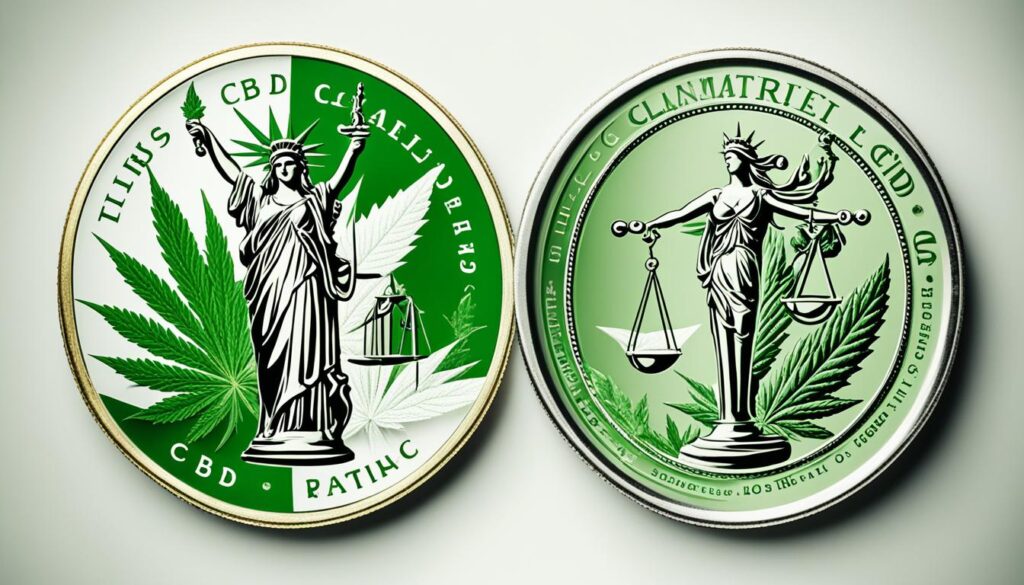
Side Effects and Safety Considerations
Both CBD and THC are mostly safe to use. But, you should know about possible side effects. Using CBD might change your mood, eating habits, and liver health. To avoid issues, talk to a doctor before mixing it with other drugs.
THC could cause dry mouth, red eyes, difficulty moving, and memory issues. These usually go away as your body processes the THC. Just remember to use it carefully and not too much.
“CBD and THC are safe, but they affect everyone differently. Start with a small amount and see how you react. Stop using it and get medical help if you notice bad side effects.”
Using THC could lead to addiction for some people. This is more likely if you’ve had substance issues before. Be careful with how much you use.
CBD and THC might mess with how your body handles other medicines. This could make your meds stronger in your body and cause problems. Always let your doctor know if you’re using CBD or THC.
Potential Side Effects of CBD:
- Mood changes
- Appetite changes
- Liver function alterations
- Potential drug interactions
Common Side Effects of THC:
- Dry mouth
- Red eyes
- Impaired coordination
- Memory loss
Remember, the above side effects might not happen to everyone. Keep an eye on how you feel and talk to a doctor for a safe experience with CBD or THC.

| Side Effects | CBD | THC |
|---|---|---|
| Mood changes | ✅ | |
| Appetite changes | ✅ | |
| Liver function alterations | ✅ | |
| Potential drug interactions | ✅ | |
| Dry mouth | ✅ | |
| Red eyes | ✅ | |
| Impaired coordination | ✅ | |
| Memory loss | ✅ |
Different Forms of CBD and THC
CBD and THC come in various forms to match different needs and preferences. You can find oils for convenience, patches for targeted relief, or vapes for discreetness. Everyone can find something suitable for their needs.
“CBD comes in various forms such as oils, extracts, patches, vapes, and topical lotions.”
If you prefer CBD, oils are available. They can be taken orally or mixed with drinks or recipes. CBD extracts offer potent doses for stronger effects. Patches slowly release CBD for long-lasting relief.
Vapes provide a quick way to experience CBD benefits. Topical lotions can be applied directly to the body where needed.
If THC interests you, there are many options available. Smokable products like flower or joints offer instant effects. THC oils and tinctures allow for discreet use. Shoot for edibles like brownies if you want something sweet.
For those avoiding smoke, THC-infused beverages and creams exist. There’s something for every taste and preference.
“THC is available in smokable products, oils, tinctures, and edibles such as brownies and beverages.”
When picking a form of CBD or THC, think about what you’re looking for. Consider your effects, likes, and any rules in your area. Knowing the options helps you choose the best one for you.
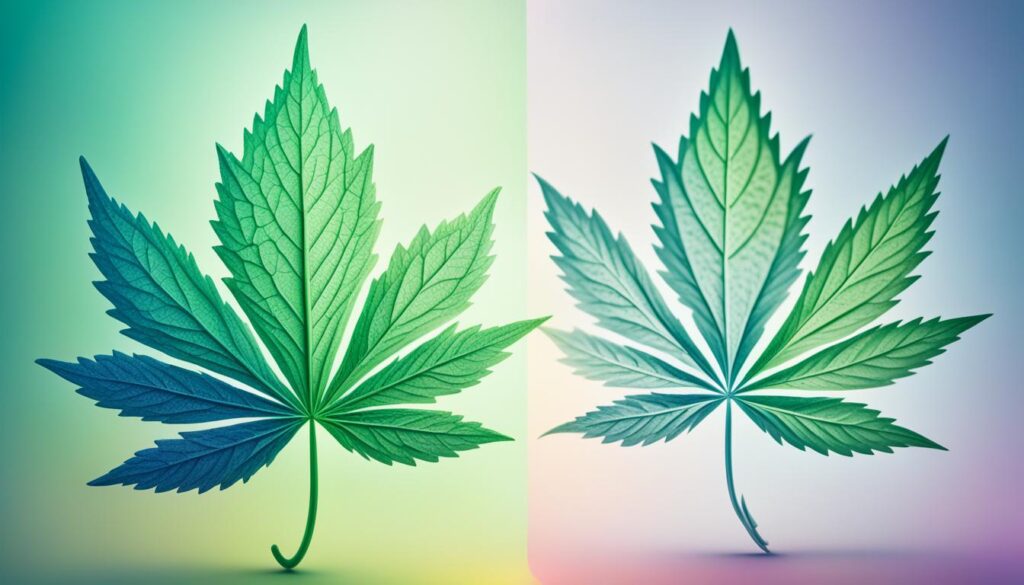
Comparison of CBD and THC Forms
| Form | CBD | THC |
|---|---|---|
| Oils |
|
|
| Patches |
|
– |
| Vapes |
|
|
| Topical Lotions |
|
– |
| Smokable Products | – |
|
| Edibles | – |
|
Conclusion: Understanding the Differences and Making Informed Choices
It’s key to know how CBD and THC differ to choose wisely. They can both be good for health, but they’re not the same. You’ll find differences in their effects, legal status, and where you can get them.
CBD doesn’t affect your mind and is easy to find. It might help with various health issues. THC, however, does affect your mind and isn’t as freely available due to stricter laws. Yet, it can be used for health too.
Before using CBD or THC, talking to a doctor is very important. It’s also vital to know your state’s laws. CBD is easy to find, but THC might not be legal everywhere.
Knowing the differences helps you make smart choices for your health. Always consider the benefits and legal issues. Don’t forget to seek advice from a medical expert.